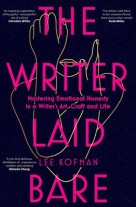We can be thankful Lee Kofman suffered for four years from writer’s block because it ultimately led her to a deep examination of why she was stuck.
Having clarified (the hard way) the dread that was holding her back, she developed strategies to get herself back on track. She poured these insights into her blog and then The Writer Laid Bare: Mastering emotional honesty in a writer’s art, craft and life – creating the book she wished she’d had to guide her as she’d struggled, hating everything she wrote and rarely finishing anything.
‘If only someone back then pointed out that my difficulties weren’t a sign that I couldn’t write,’ Kofman says in her new book released in April, ‘that struggling with authenticity, candour and self-understanding is something writers must do, often throughout their entire lives.’
Kofman is a Russian-born, Israeli-Australian writer, editor, writing teacher and mentor. When she was 12, the family moved to Israel and then at the age of 26, she moved to Australia on her own.
Her first three books, written in Hebrew, are fiction, and the remaining five, all written in English, are in the creative non-fiction genre.
The Writer Laid Bare mingles memoir with writerly guidance – the latter fired in the crucible of experience and shaped through a lifetime of reading.
‘I read Master and Margarita first when I was ten, while still living under the Soviet dictatorship and it taught me all I needed to know about the power of laughter in the face of the despicable,’ she writes.
The reference list at the back of The Writer Laid Bare is a work of wonder and a clear indication of just how delightfully well-read she is.
Kofman’s practical advice for writers ranges widely with chapters on being alive to inspiration, choosing your subject, finding a conducive space for writing, finding your voice, using social media, building relationships with publishers, rewriting, and showing up to write regularly.
She confesses that the ‘lion’ grows more feral when she writes spasmodically. Writing more regularly doesn’t make her fear of writing go away, she says, but it does make it more manageable.
I relished the way Kofman identifies a general challenge facing writers and then teases out the specifics of how she and other writers over the centuries have dealt with them.
Some wisdom I hope to take into my own writing life includes:
- Nursing my obsessions – trusting that if they return it’s because I haven’t ‘exhausted my investigation of them yet’.
- Waiting more patiently for the muses – because they often appear when you least expect them to.
- Remembering ‘revision is the real writing’ – and that leaving time between drafts can help to sort the sheep from the goats.
- Acknowledging sustainable writing practice requires physical self-care. (And a screaming back, jittery legs and red-raw screen eyes aren’t it.)
- Reminding myself that the writing process is more than ‘mysterious machinations of sexy Olympic muses. It is also a pragmatic endeavour of ongoing problem solving.’
- ‘Fostering the art of deep observation to reach towards the dark, the complex, the paradoxical, the tense, the raw, and towards the truths of the stories we tell’. (Training myself to really see.)
One of my favourite take-home messages from the book is to read widely and well.
‘From the age of four,’ Kofman writes, ‘I’ve read every day. I need reading for the same reasons others need meditation or wine – to ground myself, maintain my mental health.
‘I like imagining books inside our conscious as well as unconscious memory as organic matter, slowly breaking down to blend into a rich compost that nurtures the seedlings of our own works.’
On the strength of Kofman’s recommendations (and her composting metaphor!), I’ve loaded my e-reader with books by Geoff Dyer, Bruno Schultz, Louis Simpson and Amos Oz to read on my next break from paid work.
I’ve also taken to heart her reminder to prioritise time to cultivate relationships with other writers who understand your struggles and with whom you can be mutually supportive.
To propel this, I’ve contacted my best writing buddy and we’ve now booked a few days together off the grid.
In that less cluttered place, we’ll circle our fears, share some drafts, celebrate our friendship, shoot the breeze, set a few goals, read some books and watch the sea.
Buoyed by the belief in each other’s writing, we’ll find fresh motivation to wrestle the beast.
_____
The Writer Laid Bare: Mastering emotional honesty in a writer’s art, craft and life
Lee Kofman
Ventura Press
$32.99
This review was first published in the South Sydney Herald in May 2022.




Recent Comments